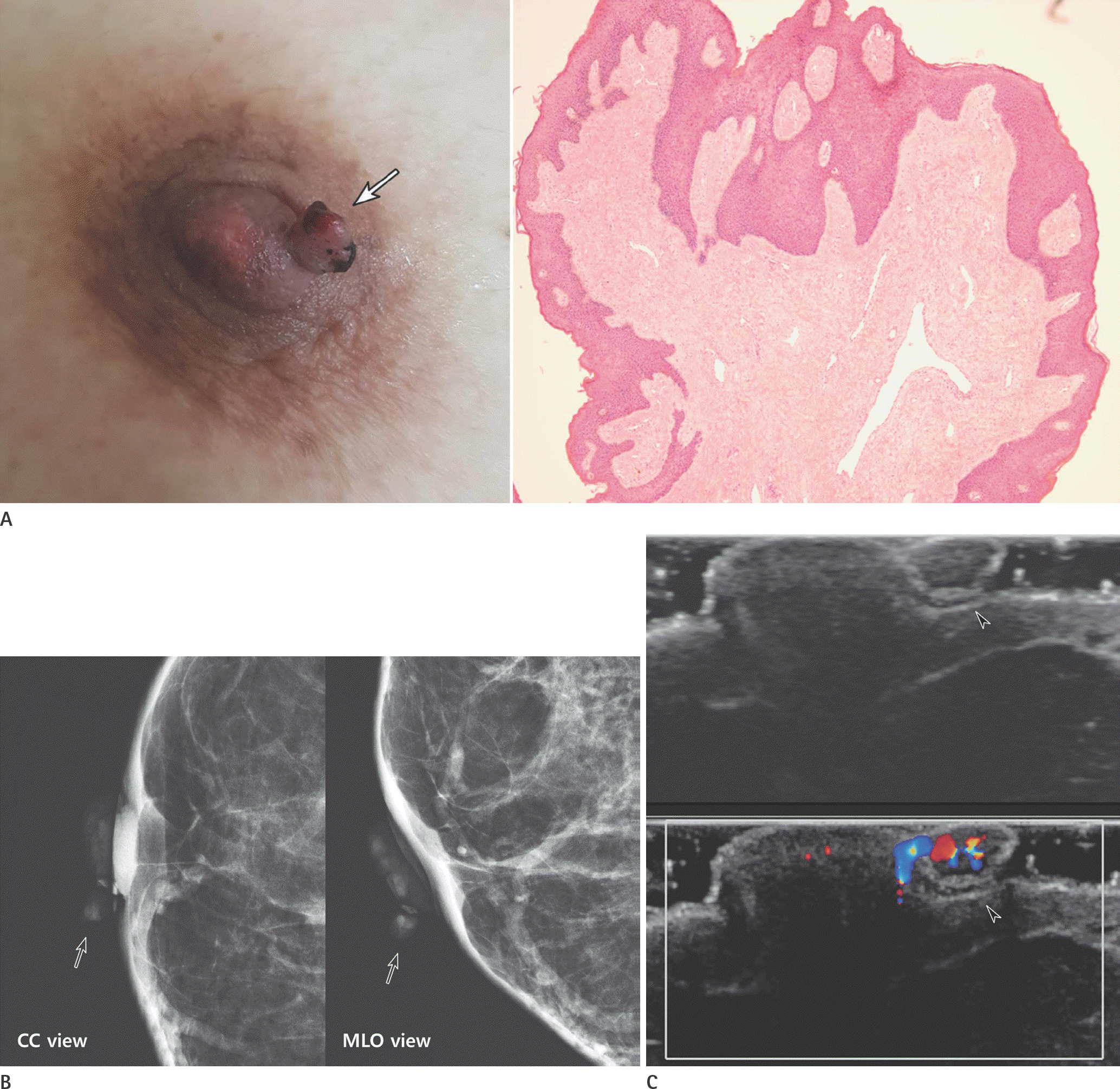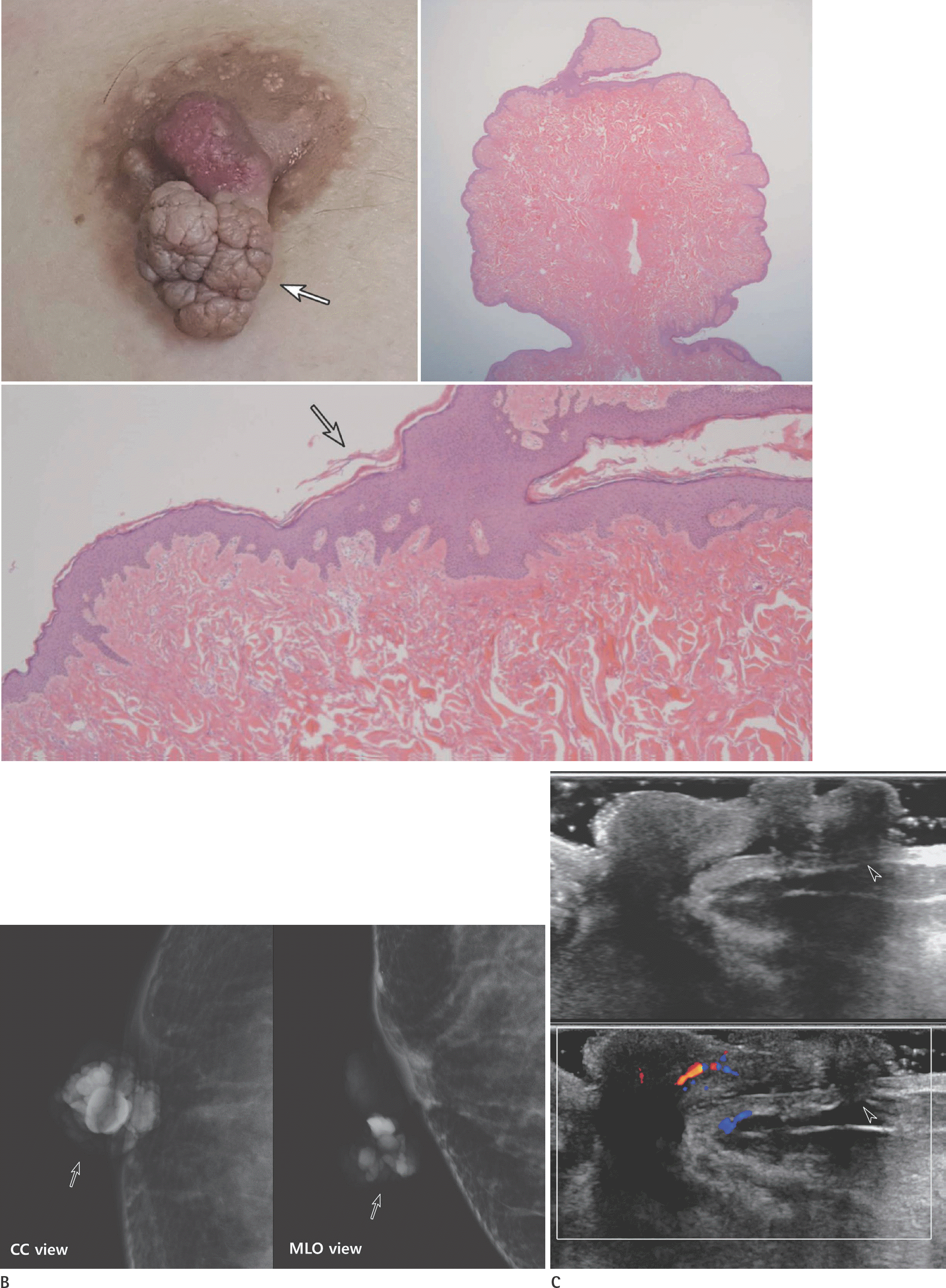Abstract
Soft fibromas are benign skin lesions that primarily occur in the neck, axillae, and groin locations. The occurrence of soft fibroma lesions in the nipple is extremely rare. Herein, we present two cases of soft fibroma of the nipple, which occurred in a 51-year-old woman (Case 1) and a 32-year-old woman (Case 2). The mammographic and ultrasonographic features of each case are described in this report. Mammography revealed an oval-shaped isodense mass in Case 1 and an irregular-shaped isodense mass in Case 2. On ultrasonography, Case 1 showed an oval-shaped hypoechoic mass with increased vascularity, whereas Case 2 presented a microlobulated, irregular-shaped, iso- to hypo-echoic mass with subtly increased vascularity at the stalk. In both cases, surgical excision was performed and pathological examination revealed soft fibroma.
Go to : 
REFERENCES
1.Madueke-Laveaux OS., Gogoi R., Stoner G. Giant fibroepithelial stromal polyp of the vulva: largest case reported. Ann Surg Innov Res. 2013. 7:8.

2.Wali V., Wali VV. Assessment of various biochemical parameters and BMI in patients with skin tags. J Clin Diagn Res. 2016. 10:BC09–BC11.
3.Akpinar F., Dervis E. Association between acrochordons and the components of metabolic syndrome. Eur J Dermatol. 2012. 22:106–110.
4.Patterson JW. Practical skin pathology: a diagnostic approach. Philadelphia, PA: Elsevier/Saunders. 2013. 439–440.
5.You HS., Park SM., Cho HH., Kim WJ., Mun JH., Song M, et al. A case of soft fibroma of the nipple with a cauliflower-like appearance. Ann Dermatol. 2015. 27:102–103.

7.Shaaban AM., Turton EP., Merchant W. An unusual case of a large fibroepithelial stromal polyp presenting as a nipple mass. BMC Res Notes. 2013. 6:345.

8.Nicholson BT., Harvey JA., Cohen MA. Nipple-areolar complex: normal anatomy and benign and malignant processes. Ra-diographics. 2009. 29:509–523.

9.Giess CS., Raza S., Birdwell RL. Distinguishing breast skin lesions from superficial breast parenchymal lesions: diagnostic criteria, imaging characteristics, and pitfalls. Radiograph-ics. 2011. 31:1959–1972.

10.Spohn GP., Trotter SC., Tozbikian G., Povoski SP. Nipple adenoma in a female patient presenting with persistent erythema of the right nipple skin: case report, review of the liter-ature, clinical implications, and relevancy to health care providers who evaluate and treat patients with dermatologic conditions of the breast skin. BMC Dermatol. 2016. 16:4.

Go to : 
 | Fig. 1A 51-year-old female patient with a soft fibroma in the right nipple (Case 1). A. Left panel shows a polypoid protuberance on a right nipple, approximately 0.5 cm in size. The lesion is brownish in appearance and shows a reddish discoloration that could have preceded bleeding (arrow). Right panel shows a microscopic image of a polypoid lesion with mild acanthosis of an epidermal lining and loosely arranged fibrocollagenous stroma (hematoxylin and eosin staining, × 40). B. Mammographic CC view image and MLO view image show an exophytic isodense mass (arrows) in the right nipple without microcalcification. C. Ultrasonographic images show a circumscribed, oval-shaped hypoechoic mass 0.6 × 0.4 cm in size (arrowheads) in the right nipple. The mass shows hypervascularity on the color Doppler image. CC = craniocaudal, MLO = mediolateral oblique |
 | Fig. 2A 32-year-old female patient with a soft fibroma in the right nipple (Case 2). A. Left upper panel shows a brown-colored and multi-lobulated mass, approximately 2 cm in size, with a short pedicle (arrow). Right upper panel is a microscopic image that shows a furrowed mass with loosely arranged collagen fibers (hematoxylin and eosin staining, × 12.5). The panel below shows mild hyperkeratosis, papillomatosis, and acanthosis of the epidermis (open arrow) (hematoxylin and eosin staining, × 40). B. Mammographic CC view image and MLO view image show an irregular-shaped isodense mass (arrows) with a cauliflower-like appearance in the right nipple without microcalcification. C. Ultrasonographic images show a microlobulated, irregular-shaped, and iso- to hypoechoic mass, measuring 1.7 × 1.5 cm in size (arrowheads), with posterior shadowing on the ultrasonography gray scale image. The mass shows slightly increased vascularity at the stalk on the color Doppler image. CC = craniocaudal, MLO = mediolateral oblique |




 PDF
PDF ePub
ePub Citation
Citation Print
Print


 XML Download
XML Download